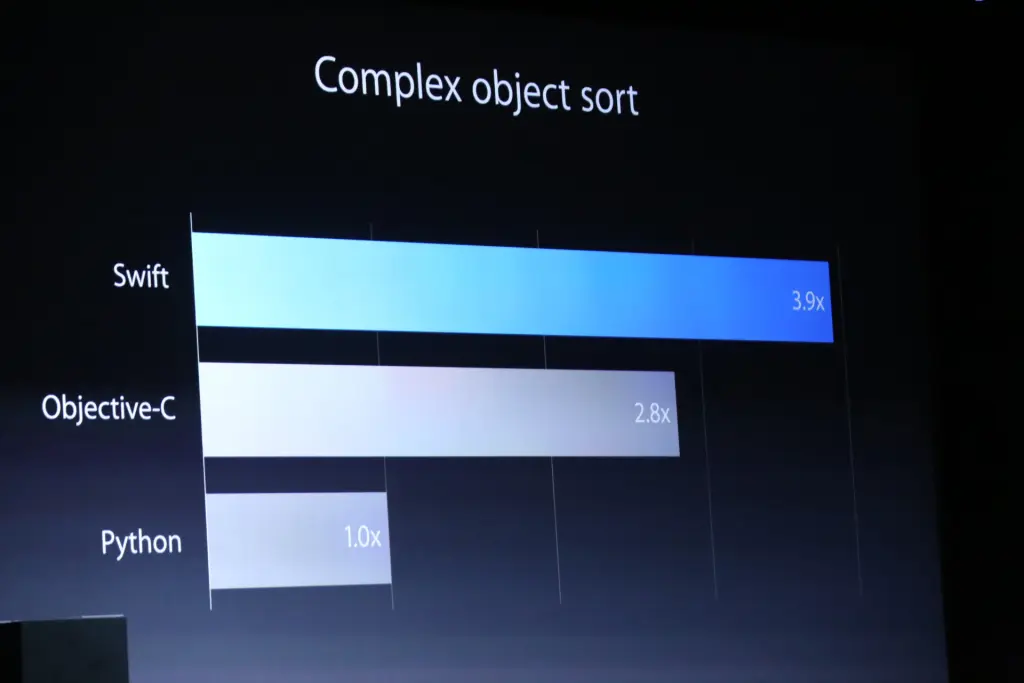Objective-C, developed in the early 1980s, has long been the backbone of iOS and macOS development. Its deep integration with Apple’s ecosystem made it a preferred choice for developers working on these platforms for decades. However, with the introduction of Swift in 2014, Apple provided a modern alternative that addresses many of the limitations and complexities of Objective-C.

Swift Pros
Swift, designed from the ground up to be faster, safer, and more efficient, has quickly gained popularity among developers. It brings several significant improvements, including enhanced readability through a more concise and expressive syntax, superior performance optimizations that leverage modern hardware, and advanced safety features that help developers write more reliable code with fewer bugs. Swift’s design is influenced by modern programming paradigms, making it not only easier to learn for new developers but also more powerful for seasoned professionals looking to build robust and scalable applications.
Moreover, Swift’s open-source nature has fostered a vibrant and growing community, contributing to its rapid evolution and adoption across various platforms beyond iOS and macOS, such as Linux and even Windows. This has expanded Swift’s appeal beyond traditional Apple developers to a broader audience, enhancing its ecosystem with a wealth of libraries, tools, and frameworks that further accelerate development and innovation.
1. Swift is Easier to Read and Maintain
Swift eliminates many legacy conventions from Objective-C. For example, Swift does not require semicolons to end lines, and parentheses around conditional expressions are optional. This helps reduce the clutter of “bracket hell” in method calls. Additionally, Swift removes the need for two separate files (header and implementation); the LLVM compiler automatically figures out dependencies.
Swift also embraces modern programming language features, such as using the + operator for string concatenation and string interpolation. This approach is both easier to read and less error-prone compared to Objective-C’s use of format specifiers like %s, %d, and %@, which can often lead to crashes.
2. Swift Offers Better Safety and Memory Management
In Objective-C, calling a method on a nil pointer does nothing, which can lead to silent failures and unexpected behavior. Swift solves this problem with optional types, allowing developers to handle the absence of a value explicitly, thus avoiding many potential bugs.
Unlike Objective-C, Swift’s Automatic Reference Counting (ARC) works across both object-oriented and procedural code. This reduces the cognitive load on developers, allowing them to focus on implementing core app logic rather than managing memory manually.
3. Swift is Faster and Less Prone to Name Collisions
Benchmarks have consistently shown that Swift performs faster than Objective-C, thanks to its modern architecture and optimizations.

An example of a benchmark conducted by Apple.
Objective-C lacked native support for namespaces, often leading to name collisions that were traditionally avoided by prefixing class names (e.g., NSArray, NSString). In Swift, namespaces are automatically determined based on the module, allowing for more flexibility and fewer conflicts. For instance, both Apple and Google frameworks could contain a file named Authentication.swift without issue.
4. Swift Supports Dynamic Libraries
While Objective-C only supports static libraries, Swift supports dynamic libraries, which can be loaded into an app’s memory at runtime. This capability reduces the overall size of an app and allows for faster load times for new, on-demand content.
5. Swift is Open-Source with a Larger Community
Swift’s open-source nature has fostered a large and active community. It has expanded beyond Apple’s ecosystem to other environments like Linux. For example, Vapor is a popular web framework for Swift.
The Swift language is developed in the open, and all technical or administrative topics about the language or community processes should be directed to the Swift public forums. Public conversations are encouraged, and active developers of the Swift language should monitor the relevant forum categories.
— Swift.org
Additional Advantages of Swift Over Objective-C
Swift offers several advanced features that enhance its utility and security over Objective-C:
-
Type Safety and Optionals: Swift enforces strict type safety, reducing the risk of type-related errors that can lead to security vulnerabilities. Its use of optionals requires developers to handle
nilvalues explicitly, minimizing the risk of runtime crashes or unexpected behavior, unlike Objective-C wherenilvalues can silently fail. -
Memory Management: Both Swift and Objective-C use Automatic Reference Counting (ARC) for memory management, but Swift’s syntax and stricter rules make it easier to avoid common pitfalls like retain cycles and dangling pointers. Objective-C’s more permissive nature increases the potential for memory-related errors.
-
Bounds Checking: Swift automatically performs bounds checking on arrays and collections, which helps prevent buffer overflow vulnerabilities. In Objective-C, developers need to manually ensure that data access stays within valid bounds, increasing the risk of out-of-bounds errors.
-
Immutable by Default: Swift encourages safer code by making constants (
let) immutable by default. Objective-C requires the use of specific class types for immutability (e.g.,NSStringvs.NSMutableString), making the codebase more prone to unintended modifications if not carefully managed. -
Reduced Use of Unsafe Code: Swift avoids certain low-level operations, such as direct memory manipulation with pointers, that are more prevalent in Objective-C. This reduces the attack surface for exploits like buffer overflows and memory corruption.
-
Enhanced Privacy and Security Practices: Swift’s language features align well with modern privacy regulations (e.g., GDPR, CCPA), supporting secure coding practices more intuitively and allowing developers to implement security measures more easily compared to Objective-C.
These features make Swift a more secure choice for developing iOS applications, as it reduces common programming errors and provides built-in safeguards against many vulnerabilities.

